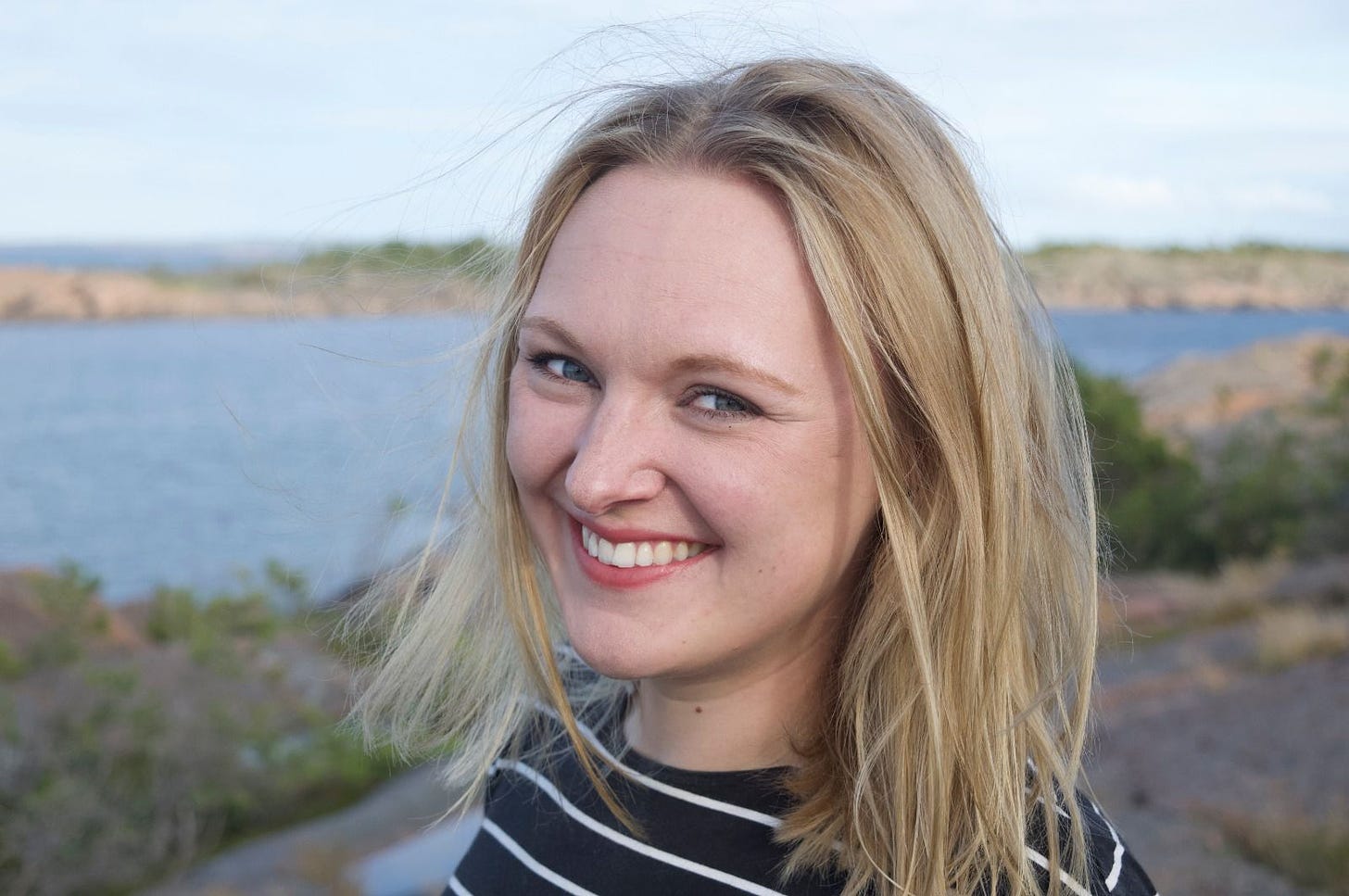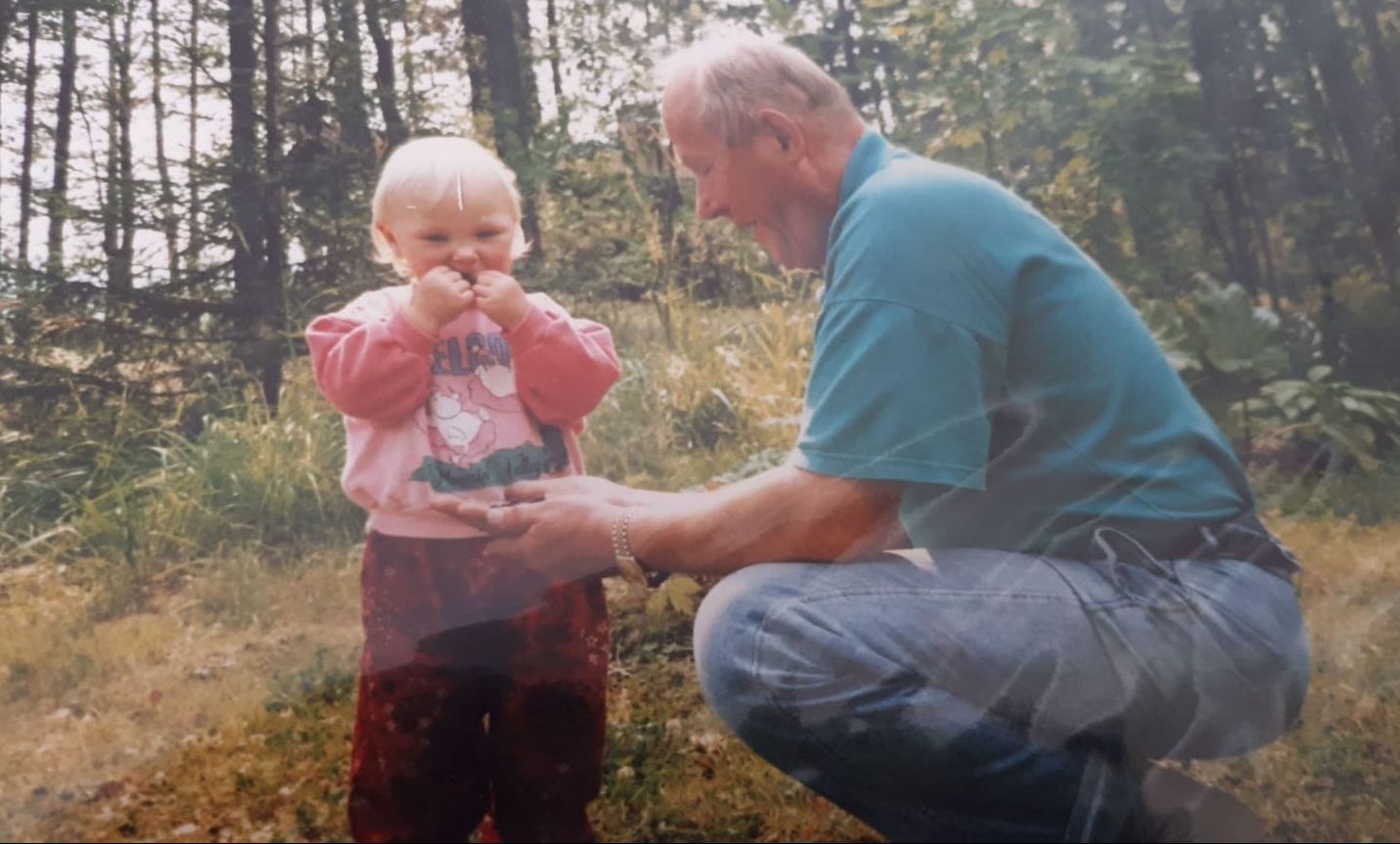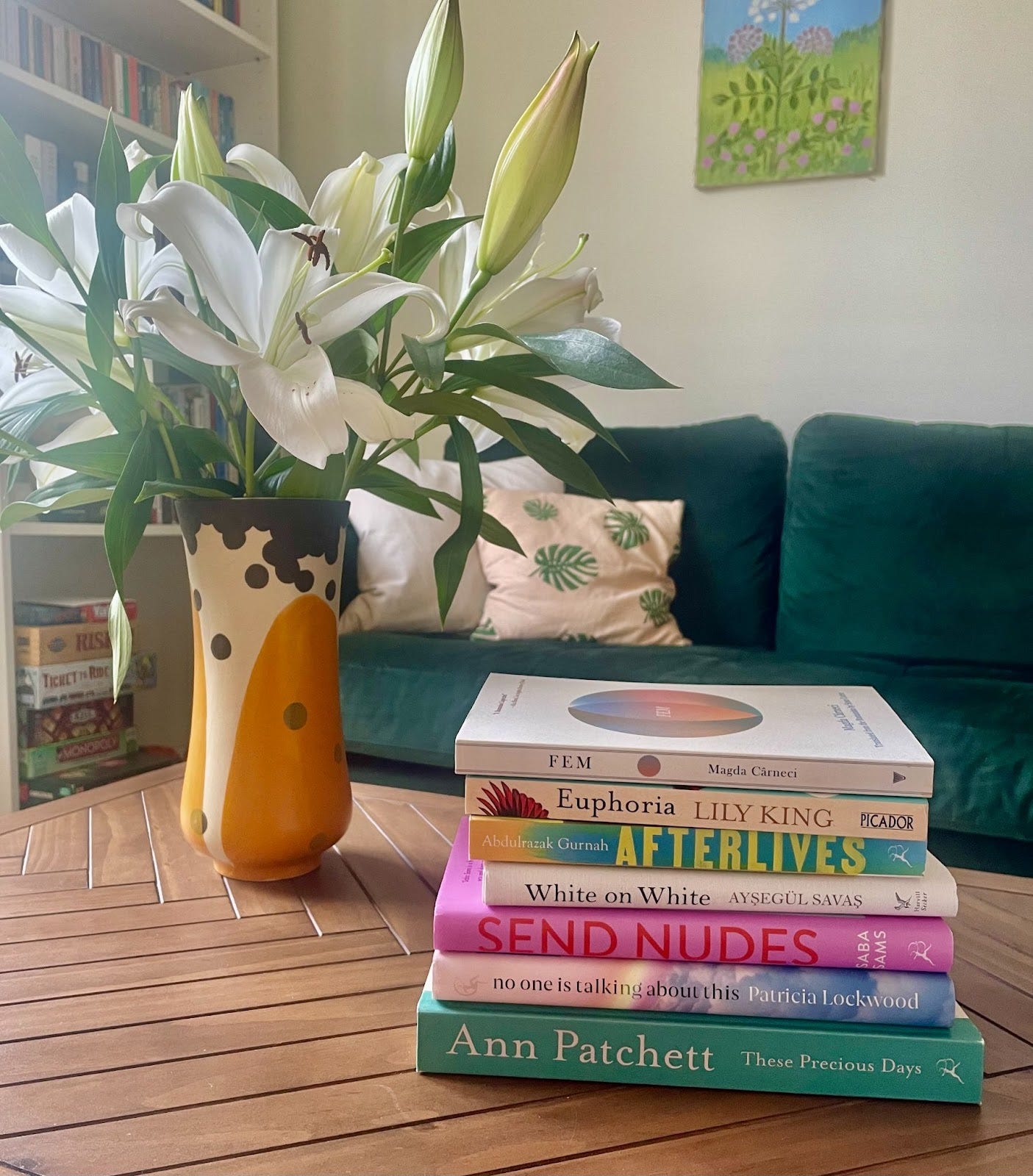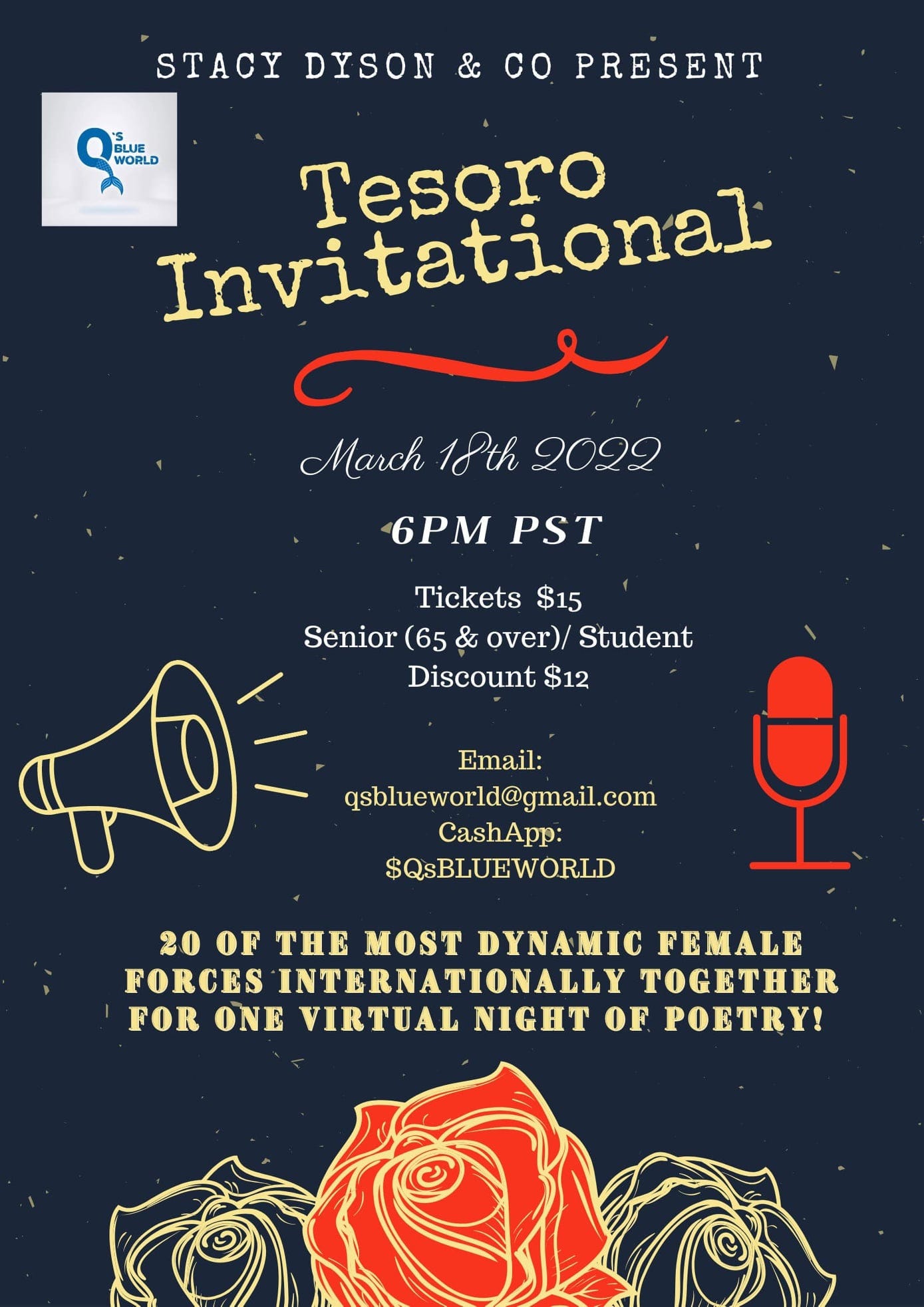Welcome! You’ve reached Spark. Learn more here or just read on. If you received this from a friend, please join us by subscribing. It’s free! All you have to do is press the button below:
In this issue:
Reading translated books always makes me wonder…what am I missing?
Tabatha Leggett is reading her way around the world: she has five years to go
Tesoro Invitational Poetry Event: women poets from around the world in one night online
You want to read Spark without adding to your inbox? There’s now an app for that (if you have an iPhone or iPad. Android is coming.)
Hoping Nothing is Lost in Translation
I have read Love in the Time of Cholera at least three times, and every time I wonder if I'd feel any differently about it if I’d been able to read it in the actual words that Gabriel Garcia Marquez used. I can’t imagine loving it less. I do wonder, though, if I’d love it even more.
Tell me about your own experience with translations. If you are a writer, has your work been translated? How did it work out? If you are a reader, are there authors or books you’ve fallen in love with thanks to the work of a translator?
When a piece of writing passes through the hands of a translator it must change, there is no way to avoid it. I imagine a kind of alchemy that takes place, words filter through the brain and soul of a translator who must try to climb inside the author’s head and heart, so I can read the book. The result will depend heavily on who is translating. I’ve seen reviews of different translations for the great Russian novels, the ancient Greek and wondered about how the story changes in each set of hands. There is no such thing as a direct line between one set of words and another. Think of what happens when we take a phone message for someone, or try to recreate a scene that we’ve witnessed in English. It is nearly impossible to convey exactly the same words, the same tone, all the conditions that affect its meaning. Every word that comes out of our mouths or we print on the page is altered by our own perspectives.
I don’t read that many translations. I read mostly books written in English – the books I’ve loved from authors whose countries are a world away are written in English. These days, though, I am also reading in Italian. I’ve started small: with Pinocchio, itself a translation from the “old” Italian into modern Italian courtesy of my teacher Laura. Now a number of short stories reside in my Kindle waiting for me. I’ve read Jhumpa Lahiri’s In Altre Parole many times. There and in other books I own, are the translations side by side, one page in Italian and the same page in English opposite courtesy of Ann Goldstein. I see more and more the little leaps that are made to convey meaning, context, the choices that must be made by a translator who in my mind stands with a foot in two worlds, both halves of her brain. To translate requires sinking into the text in a way that I envy. When I read Italian, I sink much more deeply because I must read so slowly. To echo Lahiri, it’s like learning to read all over again. I feel the same delight when I “get it,” the same desire to absorb all the words and make them and the story they tell mine.
Do you read in more than one language? When has this come in handy for you? Does the reading experience change when you shift from one language to the other?
Tabatha Leggett Wants To Read Every Country
I’ve been thinking about the quest of Tabatha Leggett, a London-based writer and the force behind Bookmarked, has joined the Spark community. She is reading a book from every country in the world and has found some beautiful reading thanks to translators. Fluent in Finnish, her mother’s native tongue, she also has begun to translate books from English into Finnish.
You can read the reviews and lists of books from the 60 countries Tabatha has covered since launching the project in August 2020 here. She figures she has another five years to go before she’s reached her goal. That means we have a good long while to enjoy her discoveries of books we may never have known of otherwise. Curious and perhaps a bit envious, I asked her to share a bit about herself and her project and, graciously, she did. Here’s our email interview.
Update me on your living and working situation. Are you still based in Helsinki or have you moved back to London? What prompted the decision to stay/go?
I’m back in London and working in translation rights at a small literary agency. When my partner and I moved to Helsinki in 2018, we promised ourselves we’d give it at least two years – in the end, we wound up staying for just over three. By then the pandemic meant we hadn’t seen our friends or family in the UK for 18 months and it felt like time to move back.
I’ve spent some time reading your past writing for everything from BuzzFeed to The Strategist, to VICE, to The London Review of Books. How did a student of philosophy wind up interviewing a sex worker and her boss or imagining her life as a celebrity for online readers? Can you trace the path from these articles and jobs to what you are doing now?
I edited my student paper at university and set out to get a job in media after graduating. I spent the first year or so interning at places like Vice and GQ whilst also working as a hostess in a cocktail bar and pitching freelance articles whenever I had time. In 2013 BuzzFeed launched in the UK and I landed a three month internship there. That internship eventually turned into a job and three months turned into five years.
By then I felt like I needed a total change of scenery and so, in 2018, my partner and I moved to Helsinki. My mum is Finnish so I’d grown up dreaming of what it would be like to live there. Around a year after making the move I transitioned from media into publishing. In an effort to improve my Finnish I’d taken on some freelance work reading Finnish books and writing reader’s reports for scouts back home. I was also translating samples of Finnish books for agents to take to book fairs and pass on to international publishers who don’t necessarily have access to Finnish readers. Eventually one of the publishers I’d been freelancing for offered me a job as a literary agent representing Finnish books in translation. Pretty much immediately I felt at home in the world of translation rights, which felt like it combined so many of my interests: books, people, languages, travel.
That was a long way of saying that I’ve had a winding career path, but one that’s always been about connecting readers with stories in some capacity.
I sense an underlying curiosity and openness to the world in your writing and in the decisions you made to move to Finland and, now, your Substack, Bookmarked which has you reading books from every country in the world. Do these things come naturally to you or do you have to cultivate them? How would you describe the young Tabatha and how would you describe the Tabatha you are now?
I grew up in North Wales and spent every summer in my grandparent’s cabin in Eastern Finland. In part I think my curiosity comes from growing up in a multicultural household but also I spent a lot of my childhood reading.
No one has ever described me as a laid-back person—I have absolutely no chill whatsoever, which is great because it means I’m interested in pretty much everything and everyone but it also makes me a chronic overthinker. One thing I’m trying to work on as I get older is worrying less about what others think my career should look like and being open to new experiences—even if they don’t fit into a neat narrative.
How does Bookmarked nurture you or your other work? Where would you like to see this go? Are there times when you struggle to keep up with it? How do you handle this? I notice, for example, that you do not charge subscribers but you have set up a way for readers to support your work financially on a more informal basis. How is this working for you?
I love everything about writing Bookmarked—the discipline of reading a book a week, seeking out writing I might not otherwise come across, the community of likeminded readers. But the cost of buying books from around the world adds up, which is why I’ve recently started offering subscribers the chance to make donations if they want to and are in a position to do so. The pace can be difficult to keep up with, especially during periods when I’m reading a lot for work or traveling, but I’m trying to get better at taking time out when I need to. But generally speaking, I find that reading fuels my creativity and seeking out new voices has been incredibly rewarding.
Can you describe a typical day or week in the life of Tabatha Leggett? I’m asking because my subscribers are both writers and/or readers. They appreciate insights into the kinds of work that a writer or book lover can find and how those doing that work keep their balance. Do you still seek opportunities to write, edit, or translate as a freelancer?
I work full time Monday-Friday and my job typically involves reading 2-3 manuscripts per week. Alongside that, I normally have one or two translation projects on the go. Right now I’m translating a children’s book and a sample of a psychological suspense novel set on a remote Finnish island. I also dedicate some time each week to writing short fiction and I’m part of a writer’s group that meets regularly via Zoom. I am not a morning person, so I do most of my creative work in evenings and at weekends. And I always read before bedtime.
As a person who has used her linguistic skills to translate the writing of others, how do you as a reader approach a book that has been translated to English? Do you ever wonder if the book would make the same impact on you if you grasped the nuances of the original language yourself? What languages do you speak?
I speak Finnish and I also started taking Swedish classes last year. I’m not sure I approach reading literature in translation in any particular way, but what I will say is how much respect I have for translators and how important I think it is to recognise their work, for example by including their names on book covers. And I always love reading translator’s notes. I’m thinking specifically of Deborah Smith’s note in Human Acts by Han Kang, Jeffrey Zuckerman’s note in Eve out of Her Ruins by Ananda Devi, Immanuel Kim’s note in Friend by Paek Nam-nyong, and Lawrence Schimel’s note in La Bastarda by Trifonia Melibea Obono.
Where do you see yourself and your project going five years from now?
Right now I’m about a third of the way through the countries of the world, so in five years I should have finally finished! It’s hard to say what I’ll be doing but I hope I’ll still be making time to read and write. I also hope we’ll have access to even more authors in translation by then.
Finally, please share with us the books on your radar for Bookmarked and any books you’ve read that you would read again.
It’s difficult to pick favourites but I’m so happy to have discovered authors like Wayétu Moore, Scholastique Mukasonga, Olga Tokarczuk, Namwali Serpell, Tara June Winch, Lena Andersson, Imbolo Mbue, Jennifer Nansubuga Makumbi, Vigdis Hjorth, and Mieko Kawakami. I loved The Fortune Men by Nadifa Mohamed, How the One-Armed Sister Sweeps Her House by Cherie Jones, Magma by Thora Hjörleifsdóttir, Transcendent Kingdom by Yaa Gyasi, Tender is the Flesh by Agustina Bazterrica, The Discomfort of Evening by Marieke Lucas Rijneveld, and Half of a Yellow Sun by Chimamanda Ngozi Adichie.
And I’m excited to get stuck into The Pear Field by Nana Ekvtimishvili, a boarding school story set in a special needs college in post-Soviet Georgia which was longlisted for the International Booker Prize last year.
Tesoro Brings Women’s Voices Together From All Over the World
Twenty women, all poets, from around the world will gather and perform online next Friday for the first Tesoro Invitational. This event not only marks the convening of some of the strongest and most powerful poets performing today, it marks the launch of a project conceived by Stacy Ardis Dyson and team dedicated to nurturing the voices of women poets wherever they live and work. Tesoro will host open mics, provide workshops, and eventually provide grants that support artists seeking anything from residencies to child care.
“These are women who lay down tracks in blood and fire. Some have been in the business for five minutes, others for 40 years,” says Stacy who, as the project’s innovator and lead poet, will perform and lead the project with many of the women who are participating in this inaugural event. “All said absolutely we need to do this.”
The project will focus on women and those who identify as women, a group that has to work harder to be noticed and to be heard in the world of spoken word, according to Stacy.
Here are the poets along with a link to more information about each of them. Tickets for the online event on March 18 are $15 ($12 for seniors). Buy tickets at PayPal: qsblueworld@gmail.com or at CashApp: SQsBLUEWORLD.
The Poets
STACY DYSON, JANE SPOKENWORD, SANDY SHAKES THE MIC, MARISSA PRADA, POET KHAN RASS FIYAA, JIJI-MARIE, ELLEN WEBRE , KEMLYN TAN BAPPE, DIOSA X, RED MEDUSA, PHYLLISHA VILLANUEVA, PHYNNE BELLE, MARTINA MCGOWAN, THE POET ROSEGOLD , STEPHANIE CHAN, KIMBERLY ANDERSON, LEONORA SIMANOVIS , CHRISTINE PONCE-DIAZ, DIANE WARD, TORI LUTZ
The Substack App
Here’s a bit more information about how you can read Spark in the new Substack app for iPhone or your iPad if you would like to. I was in the group of newsletter writers who tested the Beta - it does have some nice advantages for readers so take a look. But if you like finding Spark in your email every Saturday there is no need to change. If you have ANY questions or issues, please let me know. The most important thing for us is to stay connected.
With the app, you’ll have a dedicated Inbox for my Substack and any others you subscribe to. New posts will never get lost in your email filters, or stuck in spam. Longer posts (like this one!) will never be cut-off by your email app. Comments and rich media will all work seamlessly. Overall, it’s a big upgrade to the reading experience.
The Substack app is currently available for iOS. If you don’t have an Apple device, you can join the Android waitlist here.
Lost in Translation: The Movie
I loved this movie. In case you’re in the mood to watch an oldie but goodie that fits this week’s theme, here you go:
Whew! That’s it for this week. Let me know how you are and what you are reading. I’ve been loving the conversations we’ve been having in the comments section and I always love hearing from you by email.
As you know, most of the books mentioned here today can be found on the Spark Community Recommendations page at bookshop.org where every purchase supports local bookstores and, if we raise enough through the commissions, to support literacy programs chosen by our community.
Oh, and if you know any folks who would enjoy chiming in, please share and invite them to subscribe. It’s free and all are welcome! Here are two buttons button that make it easy:
Ciao for now.
Gratefully,
Betsy
P.S. And now, your moment of Zen…It’s that time of year again
Sometimes the signs of spring can be slow in coming but when the sap starts running, we know it’s on it’s way as Jen (NH), reminds us with this year’s view of the shack where she is, as I type, busy making syrup.
Calling for Your Contribution to “Moment of Zen”
What is YOUR moment of Zen? Send me your photos, a video, a drawing, a song, a poem, or anything with a visual that moved you, thrilled you, calmed you. Or just cracked you up. This feature is wide open for your own personal interpretation.
Come on, go through your photos, your memories or just keep your eyes and ears to the ground and then share. Send your photos/links, etc. to me by replying to this email or simply by sending to: elizabethmarro@substack.com. The main guidelines are probably already obvious: don’t hurt anyone -- don’t send anything that violates the privacy of someone you love or even someone you hate, don’t send anything divisive, or aimed at disparaging others. Our Zen moments are to help us connect, to bond, to learn, to wonder, to share -- to escape the world for a little bit and return refreshed.
I can’t wait to see what you send!









What a great project! I like that it shows the variety of genres around the world, too. Great read.
I loved the movie too, and Tabitha's project - wow!